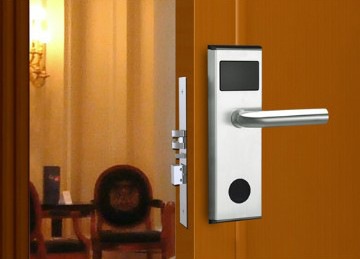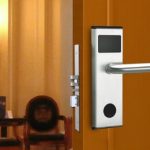
Originally made from wood, door locks and keys have been around since ancient times, offering protection and a sense of security. Eventually, metal replaced wood, but lock technology remained essentially unchanged for well more than a thousand years until the 19th century. It wasn’t until the 1970s that hotel door locks experienced a groundbreaking transformation with the introduction of the hotel key card system.
When hotel key cards began replacing traditional metal hotel keys, it represented a giant leap forward in hotel security, with even the most basic key card door locks reducing break-ins by upwards of 80%. Key cards have also helped protect against employee theft, leveraging hotel door lock technology that monitors door entries and restricts employee access to assigned sets of rooms during specified hours.
Hotel Key Card System Options
When it comes to hotel door lock options, there are a few, including magnetic stripe key cards, RFID key cards, and smart cards, each having their advantages. Magnetic stripe key cards have been in use for nearly half a century as hotel keys, and continue to offer a cost-effective approach to access control. Assuming they’re not kept as souvenirs, RFID key cards have a longer shelf life than magnetic stripe key cards, but at a higher cost. Also, hotel door locks utilizing RFID technology are sealed off from dirt and debris that might find their way into a magnetic stripe key card lock. Without wear and friction, RFID key cards, locks and encoders typically experience extended life.
Smart cards, The latest incarnation of the hotel key card, not only offer enhanced security, but also offer opportunities for marketing personalization. Smart cards used by guests throughout a property provide hotels with insights into guest movement patterns and preferences, including access to various amenities. This helps build a guest profile that will not only assist in offering personalized service, but also personalized marketing offers, known as 1:1 marketing.
Smart cards used by hotel staff also have the ability to streamline hotel maintenance and work order fulfillment, as well as logging of thousands of door entries in a centralized database, as well as other advantages.
Hotel Door Lock Suppliers
As the hotel door lock industry has evolved, the number of suppliers has both grown and consolidated. While each supplier may have strengths suited to specific property types, their hotel key technology is often not proprietary. This provides hotel operators with an opportunity to shop around for consumables (key cards), which are often found at a better price from third-party key card suppliers.
Hotel door lock suppliers and brands include:
- ASSA ABLOY Hospitality (Formerly VingCard Elsafe)
- Onity
- Kaba
- ILCO
- Safelok
- Tesa
- Sargent
- Cisa
- Miwa
- Inhova
What you Need to Know When Shopping for Hotel Key Cards
When shopping around for hotel key cards from a third party supplier, there are a couple of things to keep in mind. When it comes to magnetic stripe key cards, it’s important to know whether the magnetic stripes on your current key cards are high coercivity (HiCo) or low coercivity (LoCo). This will ensure that your key card encoder successfully transfers lock data to your cards. If you’re unsure, you can either obtain this information from your lock provider, or send your cards in to the key card supplier to be tested.
For RFID key cards, it’s important to know the type of RFID chip embedded in the card. While this information can either be found in your lock documentation or obtained from your door lock supplier, it can also be discovered by obtaining RFID card samples from a qualified RFID key supplier.
There are a lot of options when choosing a hotel door lock or management system. However, selecting the right key card supplier is a painless process, based on card quality, price and exceptional customer service.

